A Political Companion to Saul Bellow
A Political Companion to
Saul Bellow
Edited by
G LORIA L. C RONIN
and
L EE T REPANIER
Copyright 2013 by The University Press of Kentucky
Scholarly publisher for the Commonwealth,
serving Bellarmine University, Berea College, Centre College of Kentucky, Eastern Kentucky University, The Filson Historical Society, Georgetown College, Kentucky Historical Society, Kentucky State University, Morehead State University, Murray State University, Northern Kentucky University, Transylvania University, University of Kentucky, University of Louisville, and Western Kentucky University.
All rights reserved.
Editorial and Sales Offices: The University Press of Kentucky
663 South Limestone Street, Lexington, Kentucky 40508-4008
www.kentuckypress.com
17 16 15 14 13 5 4 3 2 1
Library of Congress Cataloging-in-Publication Data
A political companion to Saul Bellow / edited by Gloria L. Cronin and Lee Trepanier.
pages cm.
Includes bibliographical references and index.
ISBN 978-0-8131-4185-5 (hardcover : alk. paper) ISBN 978-0-8131-4186-2 (epub) ISBN 978-0-8131-4187-9
1. Bellow, SaulPolitical and social views. 2. Politics and literatureUnited States History20th century. I. Cronin, Gloria L., 1947- editor of compilation. II. Trepanier, Lee, 1972- editor of compilation.
PS3503.E4488Z8185 2013
813.52dc23 2013003838
This book is printed on acid-free paper meeting the requirements of the American National Standard for Permanence in Paper for Printed Library Materials.
Manufactured in the United States of America.

Member of the Association of American University Presses
Contents
Lee Trepanier and Gloria L. Cronin
Judie Newman
Ben Siegel
Michael Austin
Daniel K. Muhlestein
Carol R. Smith
Victoria Aarons
Andrew Gordon
Willis Salomon
Gloria L. Cronin
Gloria L. Cronin
Series Foreword
Those who undertake a study of American political thought must attend to the great theorists, philosophers, and essayists. Such a study is incomplete, however, if it neglects American literature, one of the greatest repositories of the nations political thought and teachings.
Americas literature is distinctive because it is, above all, intended for a democratic citizenry. In contrast to eras when an author would aim to inform or influence a select aristocratic audience, in democratic times, public influence and education must resonate with a more expansive, less leisured, and diverse audience to be effective. The great works of Americas literary tradition are the natural locus of democratic political teaching. Invoking the interest and attention of citizens through the pleasures afforded by the literary form, many of Americas great thinkers sought to forge a democratic public philosophy with subtle and often challenging teachings that unfolded in narrative, plot, and character development. Perhaps more than any other nations literary tradition, American literature is ineluctably political shaped by democracy as much as it has in turn shaped democracy.
The Political Companions to Great American Authors series highlights the teachings of the great authors in Americas literary and belletristic tradition. An astute political interpretation of Americas literary tradition requires careful, patient, and attentive readers who approach the text with a view to understanding its underlying messages about citizenship and democracy. Essayists in this series approach the classic texts not with a hermeneutics of suspicion but with the curiosity of fellow citizens who believe that the great authors have something of value to teach their readers. The series brings together essays from varied approaches and viewpoints for the common purpose of elucidating the political teachings of the nations greatest authors for those seeking a better understanding of American democracy.
Patrick J. Deneen
Series Editor
INTRODUCTION
Saul Bellows Political Thought
Lee Trepanier and Gloria L. Cronin
This volume looks at the political thought and milieu of one of the great American writersperhaps the greatestof the second half of the twentieth century: Saul Bellow. Not only does Bellow confront some of the major political themes of his and our timereligious identity, race relations, and multiculturalismbut the evolution of his own political thinking from Trotskyism to neoconservatism reflects some of the significant changes in mainstream American political thought and politics itself. In this sense, Bellows own political thought in his novels, short stories, and essays captures the general political shift in mainstream America from liberalism to conservatism. A closer look at Bellows works therefore offers a closer look at Americas own political evolution.
It is also important to note that Bellows political thought was fundamentally rooted in philosophical and religious concerns about alienation, spirituality, and the nature of modern civilization. For Bellow, the disorienting nature of modern civilization with its materialism and misleading knowledge was to be recognized and sometimes resisted by his heroes, who are often alienated and suffering from spiritual emptiness. Overwhelmed by the sheer abundance that modern civilization offers in material and sexual gratification, these Bellovian heroes struggle to find spiritual meaning either in themselves, in religious and intellectual traditions, or in embracing a flawed but potentially beautiful world. The quest to cultivate individuality and discover meaning in a world that continues to become more homogeneous and that continually drives out private life was one, if not the primary, philosophical occupation in Bellows writings.
In Bellows world, European-trained and tradition-bound intellectuals are paired alongside wise-guy thugs and business con men, creating a comic style that combines the high and the low: penetrating philosophical insights are juxtaposed with street slang and bawdy jokes. The mixture of these classes of people in Bellows world creates a fertile, imaginative space where we recognize not only the shallowness and distraction of the street and finance but also the dangers of intellectual solipsism and spiritual isolation. Like Charlie Citrine in Humboldts Gift, the world may keep us from the large truth; but, also like Harry Trellman in The Actual, our intellect and ideas can cut us off from humanity.
Although he bristled at being called a Jewish writer, Bellow heroes are often Jewish, which allows him to play their tragic sense of history against American optimism. In some works, like The Adventures of Augie March and Henderson the Rain King, Bellow accents the American ethos of exploration, restlessness, and enthusiasm, while in other novels, such as The Victim, Mr. Sammlers Planet,


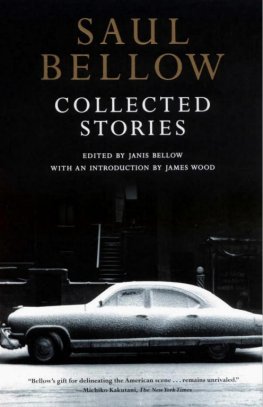
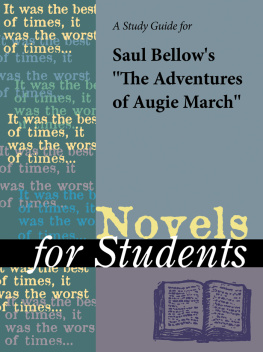
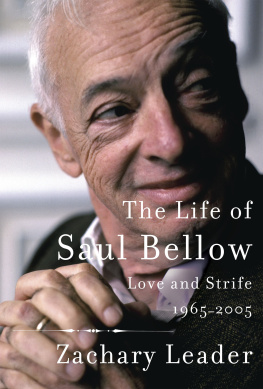
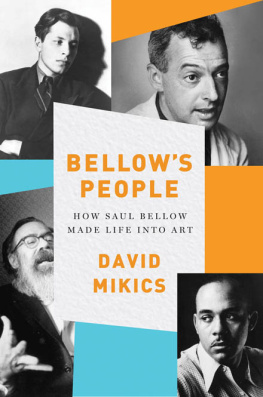
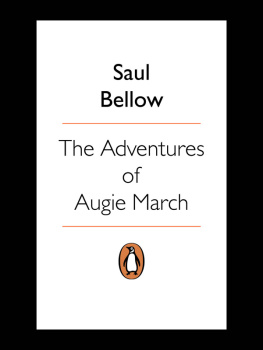
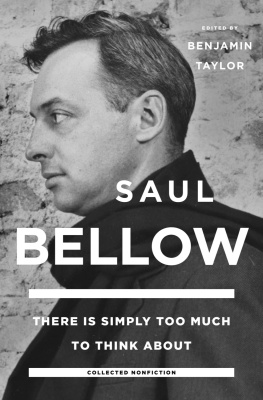

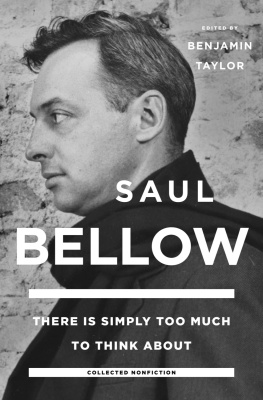
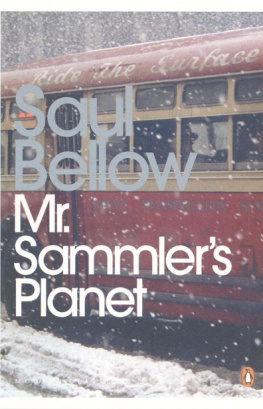
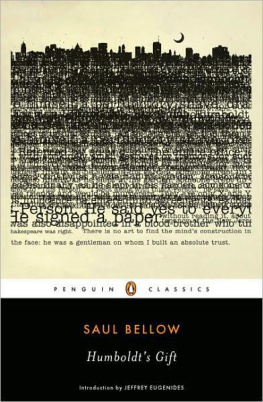
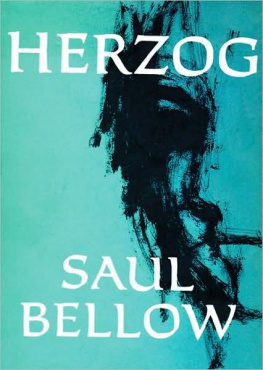


 Member of the Association of American University Presses
Member of the Association of American University Presses